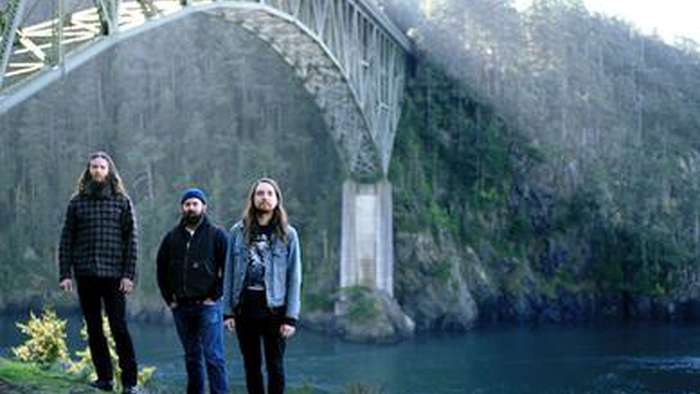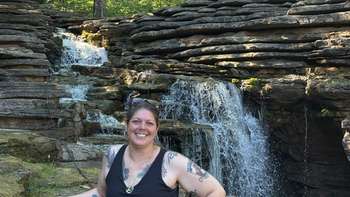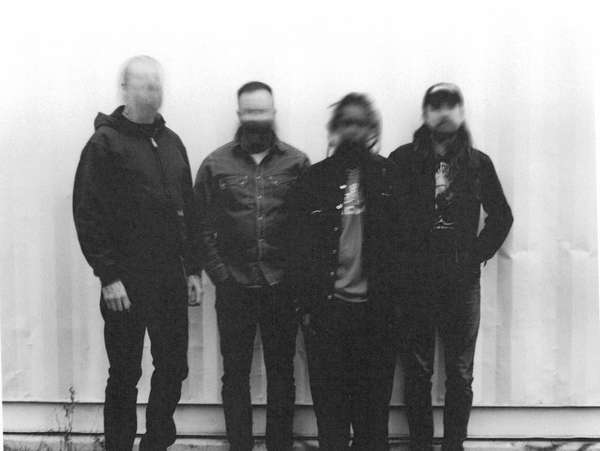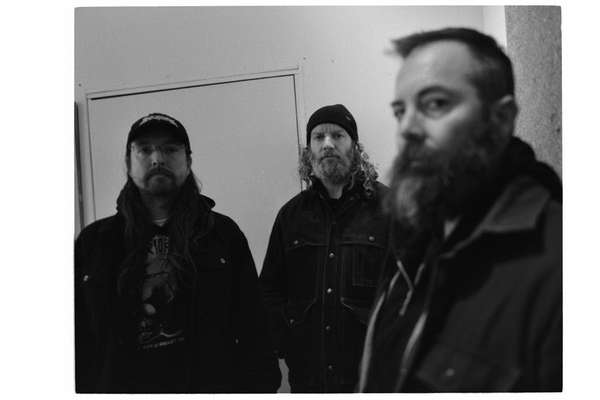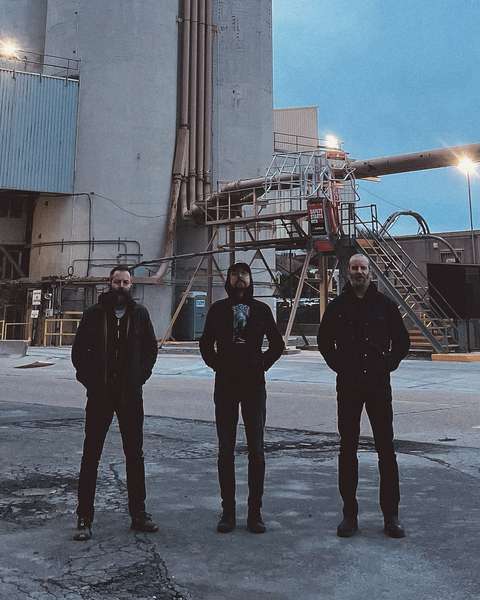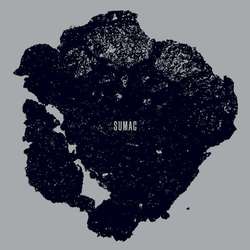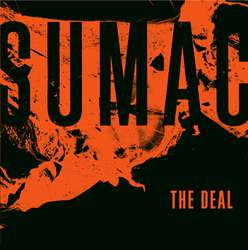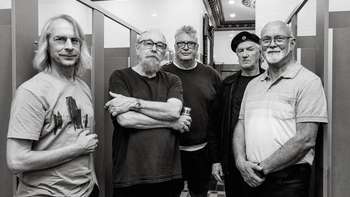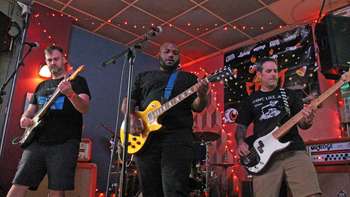In 2015 SUMAC released their debut album, The Deal, offering a first taste of their musical vision. Heavy riffs and unearthly grooves, coupled with a free form spirit ruled over the album. Aaron Turner, Nick Yacysyn and Brian Cook fulfilled their promise that SUMAC would be a full-time act, releasing just a year later, their sophomore full-length, What One Becomes, solidifying their essence as a band. In this interview Aaron Turner sheds some light into the origin of the band, the concepts addressed in their lyrics, the evolution of their sound, the abstract approach that appears in their works and their future endeavors (which sound very promising.)
Scene Point Blank: Hey guys! First of all thanks for finding the time to do this interview! It is much appreciated. Can you give an introduction to the band? How did SUMAC come to be?
Aaron Turner: SUMAC was initially conceived on a purely theoretical basis - something I was hearing in my head as far back as 13-14 years ago, but didn’t have the adequate means to bring into being. Towards the end of ISIS I knew what I wanted to do next - to follow this sound I was imagining, but it took me a few more years to find the right people to play with and to actually begin writing the music. Around late 2013 I started putting together some ideas, pieces I knew weren’t for Old Man Gloom or anything else I was involved with at the time, but something new entirely. Also around this same times I began causally looking around for people to play with - most importantly the right drummer to build the foundation of the band around. After going to shows for a while looking for someone I saw Nick perform with Baptists - I knew he was exactly the right kind of drummer, though not the drummer. I figured since he lived in Canada the distance was too great and the logistics were too complicated - I wanted someone more local. After almost another year of seeking I still hadn’t found the right person and Nick came up again in a conversation with our mutual friend Kurt Ballou who put us in touch. Shortly after that introduction we played together, found it to be a good fit and moved forward. I asked Brian Cook about joining shortly after that as Brian and I had been friends for years and Id always loved his playing. This trio melded together seamlessly and the sound/feeling I’d been chasing for years finally came into being when we completed the recording for The Deal in late 2014.
.jpg)
Scene Point Blank: You have extensively talked about the choice of name, sumac being a genus of plants, and other meanings for the word. I have recently discovered that Soumak is also a tapestry technique of weaving textiles, used as bags or rugs (Soumak derives from the Syrian word summ?q, meaning red, a point you made in the above interveiew). Where you aware of that use of the word, and is there any relationship that you find between this form of textile art and SUMAC?
Aaron Turner: There was no intentional connection between the band name and the related word Soumak that you’re referencing here. However, I like the idea of the connection to weaving - the process of writing our music feels in some way akin to that. It’s a series of repetitive actions that slowly builds towards a finished whole. It also results in a finished form that is functional for life. Though our music may not be utilitarian in the way that a bag or rug might be, I hope an intend for it to function beyond entertainment - as something that is useful for and conducive to living life, not escaping from it. Music for me is a means of functioning and surviving, and an integral part of every day life - not something that exists apart from it. The merging of creative self, creative work and what is often considered to be in opposition to that - that is, domestic life, mundane activities, etc - lies at the heart of what I hope to do with music. I want it to be something that is informed directly by life experiences of all kinds, and in turn serves to feed back into those experiences and ways of thinking/being/living.
Scene Point Blank: You released your debut album, The Deal, in 2015, and now the follow-up, What One Becomes, has arrived. How would you compare the two albums? What can you tell us about the evolution of the band so far?
Aaron Turner: The new record feels like a direct continuation from the first, and also a step beyond. By the time we recorded the new one we had formed a much tighter bond than we had going into the first record - as a collective of individuals and as a musical unit. This made the shift into more complex compositions easier and brought out an even greater willingness to experiment. In that sense the new record feels less certain to me, less concrete - and that murkiness is very important on the meaning of the record. Though I like to have a vision for our work I also like and need to surprised and challenged by it. With The Deal I felt after competing it that it was everything I’d hoped it would be. With What One Becomes I felt scared by the process because I didn’t know what was going o happen and the songs, and even the recordings often felt like they were on the verge of falling apart. I don’t want to feel that I’m stick in a safety zone with the music I/we are making - being scared and working at the edge of my abilities makes me feel more connected to the work and lets me know we’re headed in the right direction. Safety is the death of creativity more often than not. I love The Deal and feel very connected to it still, yet What One Becomes was and is a more challenging record for me and thus more exciting.
Scene Point Blank: You all participate in other groups, such as Old Man Gloom, Baptists and Russian Circles (among many more.) How much do you feel that the sound of these other groups has influenced the music of SUMAC? Do you feel restricted by that?
Aaron Turner: The only restrictions are practical - our schedules in these other bands and in our lives in general dictates to some extent what we are able to do in SUMAC - mostly in the touring department. Beyond that, there isn’t any musical/creative friction between SUMAC and any of the other bands - they all have their own personalities and don’t have a cloudy overlap. As far as how those groups have informed what SUMAC is doing, it has more to do with the tools we bring to the table than the sounds themselves. Everything I’ve done in other bands has helped me get to where I am and what I can do in SUMAC - my ability to use my instrument, my voice and words, and how to communicate effectively with my collaborators. I’d assume the same is true for Nick and Brian as well. Collective experience and maturity has helped SUMAC become a functional band much more quickly than if we we’re all just starting out as publicly active musicians.
Scene Point Blank: The song titles in the new album contain various words that express a strong sense of stability (control, rigid, clutch, will). However, the title of the album is one of change (What One Becomes.) Is this antithesis something that you wanted to highlight in your work? Is this also present in your concepts and themes as a band?
Aaron Turner: The idea of loss of control is a central lyrical theme in the album. Maintaining the appearance of control and having a strongly defined identity is a culturally propagated idea that in most cases is at least partly illusory. People are conditioned to project the idea of who they are, or what they think others wish them to be, when the real self often remains buried or unknown. This is something that I’ve struggled with at various points in my life, and was very fertile ground to draw from when working on the lyrics for the album. The latent aspects of personality that are reveled during times of struggle or extreme stress can completely corrode the projected image of identity, and that loss of control can tell us so much about who we actually are, or at the very least shed light on the parts of ourselves we don’t with to see or are afraid to show to others. So, to roughly summarize the theme you’re referring to in the song titles, is what happens when these carefully manicured, but often fragile identities we construct for ourselves are confronted and penetrated by forces we cannot contain, evade or will away. It is also about how strong we actually are and uncovering the true self that is often obscured by these protective layers of false identity.
Scene Point Blank: I felt that there was a certain mystique that surrounded the lyrics of The Deal. Can you tell us if there is a connection, lyrically between the two?
Aaron Turner: There is - it is all drawn directly from personal life experiences. Much of my writing in ISIS was about the outside world, or constructing some kind of linear narrative to base the lyrics around. I discovered in hindsight that these ways of writing were often just veils to cover up the things I wanted to work with but wasn’t able to access directly. Though the lyrical ideas in SUMAC are coming from a more personal perspective, they carry more potency for me because of this, and are perhaps more relatable for others.
Scene Point Blank: In the past, and especially with ISIS, a lot of the themes drew inspiration from writers like Borges, Cervantes, Danielewski's House of Leaves and the works of Jung. Are those also inherited now in SUMAC? That inability to distinguish illusion and reality? Or is that a chapter that is finished for you?
Aaron Turner: Of those you mentioned above, Jung is probably the only one of that group that has had much impact on my writing in SUMAC. There have also been a handful of other writers that have opened up my perspective on what it means to be human, a partner, a privileged white male, an active participant of the global community, and person who uses words and sound to communicate/connect with others. These writers who’ve changed my perspective on very fundamental aspects of life have ultimately had the most pronounced impact on my own writing and thinking, both through narrative fiction as well as biography, essays and works on self/creative analysis. James Holland, Mary Daly, bell hooks, Margaret Atwood, Kathy Acker, Alan Moore are a few that come immediately to mind.
Scene Point Blank: Since I listened to your debut album, even though it contained some very structured, heavy parts, it also felt to have parts where you take a more abstract, free form approach. What is the common ground that exists between the two in your mind? It also seemed like this abstract approach was expanded in What One Becomes. Do you feel that you will keep moving into more free form domains in the future?
Aaron Turner: This is juxtaposition of composed blocks with free form abstraction is crucial to remaining engaged with the music. There needs to be some possibility for deviation, and even failure injected into the songs. Rote repetition of songs wears me down as a live performer - I want to be able to step into something without knowing what’s going to happen or what the people I’m playing with are going to do. Freedom is an essential component to making music and something I hope to do more of. The instantaneous charge that comes from music during the very moment it transfers from the unknown into being is so exciting to me, something I live for in fact. This is part of the reason why writing in SUMAC feels so vital to me, and why being a supporting player in Mamiffer continues to feel fresh and engaging. I hope at some point SUMAC can make an album that is entirely improvised - and the improvised sections of our current songs are a tentative step in that direction.
.jpg)
Scene Point Blank: I am quite interested to hear how the creative process works for SUMAC. Is it a collaborative effort, based around jamming and additional fine-tuning, or is it more structured and precise? Is it difficult to make time for the band, since you are all involved in other projects? Did this process differ for the new album compared to The Deal?
Aaron Turner: I write all of the foundational parts and then bring them to Nick and Brian for a process of completion and refinement. Structurally my original ideas often stay fairly intact while fleshing them out with the others, but their color, dynamics and feel grow immeasurably through that process. It is difficult for us to make time to play all together, but that effort is very worth while. That I have pretty clear ideas about the direction of the songs, combined with Brian and Nick’s abilities as highly skilled and reactive players, makes our compositional work fast and fluid. That’s not to say it is effortless - in fact this is the most challenging band I think any of us has been a part of. Rather, we work in short but very intense bursts during which time the music I’ve spent quite a while developing is molded into its final forms.
Scene Point Blank: Can you talk about the artwork used in both SUMAC albums? I think that the artwork for the debut was done by Faith Coloccia? To me the debut felt more aggressive with the red/orange color, a bit more feral. While, What One Becomes with the grey background and the black ink, gives a feeling of corruption. I might be confusing people here, so do you think you talk about the relationship between the two?
Aaron Turner: The intention behind the artwork/album design was to come up with a presentation that was simultaneously abstract and iconic. I consciously strive to come up with sleeve designs that accurately represent the music, and also help to augment the viewer/listeners understanding of it. I also wanted to establish an aesthetic for SUMAC early on and work towards keeping it consistent throughout our existence. I’ve always felt drawn to bands who have very defined aesthetics - that kind of consistency makes the overall output even more compelling. One of the reasons I like Faith’s art and why it was used on the first album is that she has an exceptional grasp on form and space, and utilizes them in a way that is intuitively immersive and emotional resonant. Much like the music, the sleeves are meant to elicit strong feeling without the use of explicitly rendered images. This approach provides context/renders atmosphere that is tangible and also in someway unknowable, or at the very least without immediately recognizable signifiers. There is also an intentional feeling of primal urgency in the way the albums have been designed - again a reflection of the music. The restricted color palettes are akin to the instrumentation used in the construction of the music - maximizing the potential of limited tools and exploiting that seemingly narrow set of parameters. The nakedness of the elements lends to deeper awareness and perception of nuance, texture, and creator character.
Scene Point Blank: Can you give us information regarding the production of the new album? Where was What One Becomes recorded? Was the album recorded live? Which engineer(s) did you use for recording, mixing and mastering?
Aaron Turner: We recorded the album at The Unknown in Anacortes, WA - an old converted church. The space, atmosphere and acoustics were perfect for what we wanted - something that sounded live, raw and huge. I was hoping to find a place that would help amplify the savagery of the music and that would help foster the mood - The Unknown worked well on both accounts. We didn’t know much about it before going there - Faith discovered their blog when when investigating some of the stuff that surrounds the musical community up there. Kurt Ballou came out to engineer the record and mixed it at his own studio (God City - Salem, MA). I’ve been working with Kurt on and off in various projects for almost twenty years now and find his work is just getting better and better. We recorded the basic tracks live with all of us playing together, though we didn’t keep all of the original takes - Brian and I went back and corrected some of our mistakes and did a bit of additional overdubbing, though as little as possible. Nick did some percussion overdubs as well, using some of the implements they had at the studio - which were many. These additions were few and kept mostly peripheral in the mix as my intention with this band has been to keep the recordings fairly pure - I’d want them to sound like what we sound like live. We tried a few different mastering engineers and ultimately went with James Plotkin. I’ve worked with him many times over the years and I think he’s got great ears and a good sense of how to handle this kind of music. His test master immediately captured the energy of the original mixes and helped create greater depth and dimension.
"I’ve always felt drawn to bands who have very defined aesthetics - that kind of consistency makes the overall output even more compelling."
Scene Point Blank: Since it look like you guys are working very fast with SUMAC, are we to expect more new music coming our way? Maybe an EP or a collaboration?
Aaron Turner: Nothing planned yet - this new record is still fresh and our attention is pretty well trained on it at the moment. I am already thinking about the next TWO albums though …. What I have in mind now will probably change quite a bit by the time we get there, yet I’m excited to work on them both as soon as possible. As far as collaborations go I hope we have a chance to do something like that down the road. Currently Kevin Drumm is working on a remix of one of our tracks, and while this isn’t exactly a collaboration I’m very excited to hear what he comes up with. I’ve enjoyed Kevin’s work for many years and it’s always refreshing to hear your own work filtered through someone else’s lens.
Scene Point Blank: Do you guys have any plans for upcoming gigs?
Aaron Turner: West coast tour in the US in May, short European tour in July, and an east coast tour in the US in August. None of them are long, but we’re doing as much as we possibly can according to our schedules. Playing live with this band is a highlight of our activities together, so I hope we can make our way to as many parts of the world as possible. I’ve done a fair amount of touring with the other bands I’ve been in or am still in, but there’s still quite a few places I haven’t had the opportunity to play and would love to: anywhere in South America, China, Alaska, far Eastern Europe, etc.
